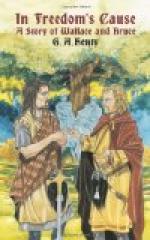The Scottish archers, now that their formidable opponents had left the field, opened a heavy fire over the heads of the pikemen upon the horsemen surrounding the squares, and when they had shot away their arrows sallied out and mingled in the confused mass of the enemy, doing tremendous execution with their axes and knives. Hitherto the king had kept his reserve in hand; but now that the English archers were defeated and their horsemen in inextricable confusion, he moved his division down and joined in the melee, his men shouting his well known battle cry.
Every Scotch soldier on the field was now engaged. No longer did the battle cries of the various parties rise in the air. Men had no breath to waste in shouting, but each fought silently and desperately with spear or axe, and the sound of clanging blows of weapons, of mighty crash of sword or battleaxe on steel armour, with the cries and groans of wounded men were alone heard. Over and over again the English knights drew back a little so as to gain speed and impetus, and flung themselves on the Scottish spears, but ever without effect, while little by little the close ranks of the Scotch pressed forward until, as the space between their front and the brook narrowed, the whole of the English divisions became pent up together, more and more incapable of using their strength to advantage. The slaughter in their front divisions had already been terrible. Again and again fresh troops had taken the places of those who had formed the front ranks, but many of their best and bravest had fallen. The confusion was too great for their leaders to be able to direct them with advantage, and seeing the failure of every effort to break the




